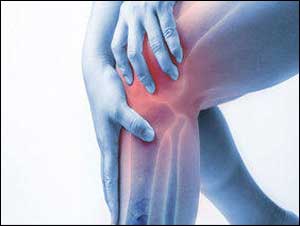- Home
- Editorial
- News
- Practice Guidelines
- Anesthesiology Guidelines
- Cancer Guidelines
- Cardiac Sciences Guidelines
- Critical Care Guidelines
- Dentistry Guidelines
- Dermatology Guidelines
- Diabetes and Endo Guidelines
- Diagnostics Guidelines
- ENT Guidelines
- Featured Practice Guidelines
- Gastroenterology Guidelines
- Geriatrics Guidelines
- Medicine Guidelines
- Nephrology Guidelines
- Neurosciences Guidelines
- Obs and Gynae Guidelines
- Ophthalmology Guidelines
- Orthopaedics Guidelines
- Paediatrics Guidelines
- Psychiatry Guidelines
- Pulmonology Guidelines
- Radiology Guidelines
- Surgery Guidelines
- Urology Guidelines
Intra articular Sprifermin beneficial for knee osteoarthritis patients, finds JAMA Study

USA: The intra-articular administration of 100 μg of sprifermin every 6 or 12 months versus placebo brought about an improvement in total femorotibial joint cartilage thickness after 2 years in patients with symptomatic radiographic knee osteoarthritis, according to FORWARD Randomized Clinical Trial.
According to the study published in the JAMA journal, the improvement in thickness was statistically significant, but of uncertain clinical importance. Also, there was no significant difference for 30 μg of sprifermin every 6 or 12 months vs placebo.
Osteoarthritis is the most common form of arthritis in the knee which has become one of the leading causes of disability in older adults. Presently there is no cure for knee osteoarthritis besides knee replacement.
Sprifermin is a recombinant human fibroblast growth factor 18 and is been investigated as a disease-modifying osteoarthritis drug. Marc C. Hochberg, School of Medicine, University of Maryland, Baltimore, and colleagues evaluated the effects of sprifermin on changes in total femorotibial joint cartilage thickness in the more symptomatic knee of patients with osteoarthritis.
The FORWARD trial - was a 5-year, dose-finding, multicenter randomized clinical trial conducted at 10 sites - involved 549 participants(aged 40 to 85 years); of which 474 (86.3%) completed 2-year follow-up. The patients had symptomatic, radiographic knee osteoarthritis and Kellgren-Lawrence grade 2 or 3.
The participants were randomized to 1 of 5 groups: intra-articular injections of 100 μg of sprifermin administered every 6 months (n = 110) or every 12 months (n = 110), 30 μg of sprifermin every 6 months (n = 111) or every 12 months (n = 110), or placebo every 6 months (n = 108). Each treatment consisted of weekly injections over 3 weeks. The primary outcome at 2 years and a follow-up analysis at 3 years are reported.
The primary endpoint was a change in total femorotibial joint cartilage thickness measured by quantitative magnetic resonance imaging at 2 years.
Key findings of the study include:
- Compared with placebo, the changes from baseline to 2 years in total femorotibial joint cartilage thickness were 0.05 mm for 100 μg of sprifermin administered every 6 months; 0.04 mm for 100 μg of sprifermin every 12 months; 0.02 mm for 30 μg of sprifermin every 6 months; and 0.01 mm for 30 μg of sprifermin every 12 months.
- Compared with placebo, there were no statistically significant differences in mean absolute change from baseline in total WOMAC scores for 100 μg of sprifermin administered every 6 months or every 12 months, or for 30 μg of sprifermin every 6 months or every 12 months.
- The most frequently reported treatment-emergent adverse event was arthralgia (placebo: n = 46 [43.0%]; 100 μg of sprifermin administered every 6 months: n = 45 [41.3%]; 100 μg of sprifermin every 12 months: n = 50 [45.0%]; 30 μg of sprifermin every 6 months: n = 40 [36.0%]; and 30 μg of sprifermin every 12 months: n = 48 [44.0%]).
"Among participants with symptomatic radiographic knee osteoarthritis, the intra-articular administration of 100 μg of sprifermin every 6 or 12 months vs placebo resulted in an improvement in total femorotibial joint cartilage thickness after 2 years that was statistically significant, but of uncertain clinical importance; there was no significant difference for 30 μg of sprifermin every 6 or 12 months vs placebo. The durability of response also was uncertain," concluded the authors.
Source
doi:10.1001/jama.2019.14735

Disclaimer: This site is primarily intended for healthcare professionals. Any content/information on this website does not replace the advice of medical and/or health professionals and should not be construed as medical/diagnostic advice/endorsement or prescription. Use of this site is subject to our terms of use, privacy policy, advertisement policy. © 2020 Minerva Medical Treatment Pvt Ltd